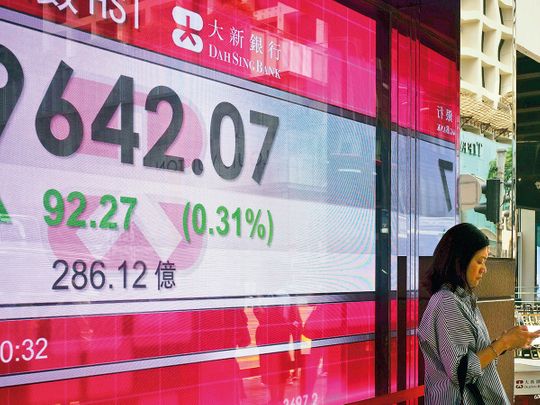
Hong Kong’s stock exchange is poised to lose its crown as the world’s leading IPO fund-raising venue again, and this time there may be no easy way back.
The bourse trails in third place behind the Nasdaq and New York exchanges so far this year, having topped the global rankings in three out of four years between 2015 and 2018. (New York broke its streak by topping the table in 2017, when Hong Kong was pushed into third place behind Shanghai.) Companies have raised $4 billion in the city in 2019, a fraction of the $35.6 billion garnered in the whole of last year, according to data compiled by Bloomberg.
There are five reasons why Hong Kong will struggle to regain its supremacy.
1. The US is hot.
Companies that had appeared happy to stay in private hands for years are suddenly going public. Lyft Inc.’s $2.3 billion offering at the end of March propelled Nasdaq to the top of the table. New York is poised to leapfrog Nasdaq when Lyft’s bigger ride-hailing rival, Uber Technologies Inc., prices an IPO that will raise as much as $9 billion later this week.
The strength of the US market is making it harder for Hong Kong to attract Chinese new-economy listing candidates. Luckin Coffee Inc., a start-up that’s challenging Starbucks Corp. in the country, is seeking to raise as much as $510 million in a Nasdaq offering. More electric-vehicle makers may choose to sell shares in the US after Shanghai-based NIO Inc. opted to list in New York last year.
That’s reflected in Hong Kong’s poor performance in attracting big listings. This year, only one IPO raised more than $1 billion in the city: last month’s $1.16 billion sale by state-owned Chinese brokerage Shenwan Hongyuan Group Co. In 2018, Hong Kong had $20.4 billion of such deals, second behind only Tokyo.
2. The market lacks depth.
A key reason why many companies choose the US is the potential to raise more funds soon after an IPO. For instance, e-commerce operator Pinduoduo Inc. held a $1.6 billion offering on the Nasdaq in July 2018; by February this year, it had sold an additional $1.2 billion of stock. Beijing-based iQiyi Inc., a Netflix-style streaming service, took in $2.4 billion from its Nasdaq IPO in March 2018; it’s since raised $1.95 billion in two convertible bond sales. Such post-IPO fundraisings are much rarer in Hong Kong.
3. Tech listings have bombed.
The marquee listings that were supposed to burnish Hong Kong’s appeal as a venue for Chinese technology companies are underwater. Smartphone maker Xiaomi Corp. has lost 37 per cent since its debut in July 2018, while food-delivery giant Meituan Dianping is down 16 per cent from its IPO in September. The stock exchange changed its rules, allowing dual-class shares to list in an effort to appeal to technology-company founders, but local investors have now soured on the sector.
To top it off, competition from mainland China is about to increase. Shanghai’s technology board will start trading within months, as local officials seek to persuade star companies to list at home rather than decamping to the US or Hong Kong.
4. Hong Kong is stuck in the past.
There’s a five-day gap in Hong Kong between when an IPO is priced and when the shares start trading. That compares with less than a day in the US, the UK and continental Europe. It’s a lot of time during which a share sale can lose buzz and momentum. The lag reflects the role of retail investors, who by law must be offered at least 10 per cent of IPOs in the city. Many subscribe by check, and the paperwork slows the process down. The system also benefits local brokerages, which can earn interest on the funds pending the allocation of IPO shares.
5. China’s off the boil.
China, which is home to a third of the world’s unicorns, will remain the prime source of IPO sustenance for Hong Kong. The trouble is that the mainland’s most lucrative candidates are in no hurry to go public. They include Bytedance Ltd., developer of the wildly popular TikTok video app; SenseTime Group Ltd., a leader in facial-recognition technology; and Ant Financial, the payments affiliate of Alibaba Group Holding Ltd. None of these are likely to list this year, either because they’re flush with cash from funding rounds or face regulatory hurdles.












